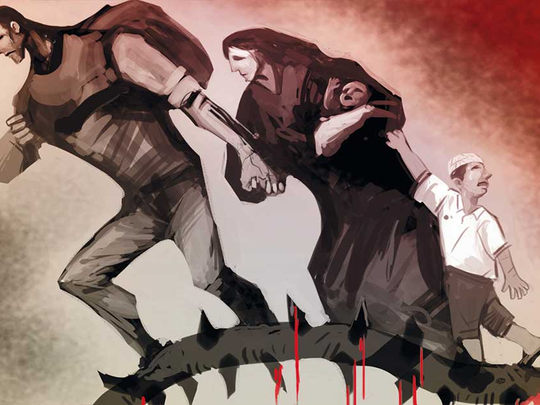
It is disconcerting to consider how refugeeism — an experience that reduces the humanity of a human being to a fragment through severance from home and homeland — has become a norm in the essential repertoire of our consciousness, so routinised a notion that after seven years, our minds are now desensitised and numbed, unable to feel shock at what is befalling the Syrian people.
Just when everyone thought that the agony of these people was nearing an end, and that surely nothing will top the cruelties they have had to endure, say, during the siege of Aleppo — known as Syria’s Stalingrad, which left an estimated 32,000 people dead, among them 6,000 children — we discovered recently that a staggering 320,000 had fled their homes in the rebel-held towns of Dara’a after Syrian government forces, along with allied militias and Russian fighter jets, subjected them to unremitting bombardment.
According to a BBC news report last week, this government and its allies at the time “carried out well over 2,350 air and artillery strikes in 23 hours”. Imagine the terror for adults and the trauma for children! This is not a regime, mind you, valiantly attacking a foreign army invading the homeland, but one callously levelling cruelty on its own people, its own citizens, the country’s very own native sons, daughters, women, children.
Dara’a, the place where protests that ended up igniting the uprising against the government in Damascus in 2011 first started, has lived up to its name, which in English translates as ‘fortress’. Dara’a is also the town where T. E. Lawrence was captured by the Ottoman military in November 17, 1917, while reconnoitring the town in disguise — an episode described evocatively in the British agent’s book, Seven Pillars of Wisdom, and shown in several extended scenes in David Lean’s 1962 epic film Lawrence of Arabia.
In a three-week period, beginning around the last week of June, the mayhem virtually emptied Dara’a out of its residents, sending them fleeing for their lives and seeking refuge in neighbouring Jordan, where they were stopped in their tracks at the border. All 320,000 of them. It’s bad enough when you’re a refugee living a host state that barely tolerates you, where you and your family live on food rations doled out by humanitarian agencies, and your children are denied the right to a childhood, but when you are a refugee stranded in a tent city, in a no-man’s land, allowed to go no further, you live a true nightmare. And if you want to know how much of a nightmare that exodus of 320,000 souls to the Jordanian border was — the largest displacement in one fell swoop since the Syrian war began — then perusing a news dispatch in the New York Times that appeared last Saturday will do the job.
“At least 15 Syrians have died in camps near the Jordanian border because of ‘scorpion bites, dehydration, and diseases transmitted through contaminated water’, according to a report published this week by the United Nations Office for the Coordination of Humanitarian Affairs. Twelve of the dead were children; two women and one elderly man also died ... Most [of the refugees] are living in campsites near the Jordanian border without adequate shelter, food or water. Thousands are sleeping in the open desert. Temperatures there can climb above 110 degrees Fahrenheit during the day, and then plunge at night”.
Not that Jordan, which sealed its border and refused to grant asylum to these folks, was evincing a lack of compassion for their plight. The kingdom “is at capacity”, as its foreign minister tweeted, citing the 1.3 million Syrian refugees already in the country.
By the end of last week, the refugees had no way out, around or through their dilemma other than to return home — to live under the rule of the same powers that had just bombed them and mercilessly ravaged their lives, the same powers that had deployed the same tactic these last seven years in the rebel-held territories: Bomb out the opposition; force them into submission — a medieval tactic, to be sure, but it has worked, except in Syria ending one nightmare has always passed into the beginning of another.
Meanwhile, as Alice Su, a contributing editor of the American monthly the Atlantic, wrote recently in the magazine, the show continues to play out, and to do so to the point of litany: “The broken ceasefires, the failed negotiations, the diplomatic hand-wringing, the blocked aid, the closed borders and the useless rhetoric, culminating in yet another victory for the Syrian government and its Russian and Iranian allies.”
This saga of refugeeism, as we contemplate it daily, only reminds us that there is no more compelling a narrative about human suffering, the kind of suffering that should — but sadly doesn’t — pull at our heartstrings, than that of refugees on the march — refugees fleeing war, refugees fleeing persecution, refugees fleeing poverty, refugees fleeing statelessness, refugees fleeing the unspeakable pain of what they are. This gut-wrenching subject should be central to our global dialogue of cultures.
Fawaz Turki is a journalist, lecturer and author based in Washington. He is the author of The Disinherited: Journal of a Palestinian Exile.








